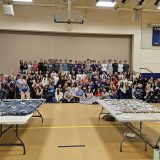
Veterans, families and elderly find help and advice at Chapman legal centers
October 6, 2016
Members of the military who lost homes to foreclosure while deployed. A grandmother confined to the bedroom of her own house by a drug-using relative. A veteran ravaged by post-traumatic stress syndrome denied benefits after receiving a dishonorable discharge.
These are some of the sorts of cases handled pro bono, or free of charge, for local residents and others by Chapman University’s
Military and Veterans’ Law Institute
and the
Alona Cortese Elder Law Center
, two of more than a half-dozen institutes and clinics that offer assistance from staff lawyers and law students at the
Fowler School of Law
to those unable to afford the legal help they need.
Housed in restored bungalows on the edges of campus, the centers help solve problems for neighbors in Orange and beyond.

The Military and Veterans’ Law Institute is dedicated to being a resource for veterans in the City of Orange and beyond. The team there includes, from left: Michael Victoria, legal intern; Kyndra Rotunda, professor and executive director of the institute; and Charles Cussalli, administrative assistant.
Kale Mosley, an Air Force combat pilot, placed a call at 2 a.m. from the middle of the Iraqi desert. He wanted to talk to Kyndra Rotunda, director of the Military and Veterans Law Institute, after learning on the day he was deployed he would be terminated shy of his 20-year pension eligibility in a measure designed to save the cost of his retirement.
After being guided through the maze of military bureaucracy by Rotunda and Chapman law graduate Joshua Flynn-Brown (B.A. ’07, J.D. ’11) before they handed off the case to a large firm, Mosley is one of 17 veterans who have taken their claim to federal court. It’s a case that has been featured in
Time
magazine as well as the
Wall Street Journal
, in an op-ed penned by Flynn-Brown and Rotunda. The pair even advocated for a bill on the veterans’ behalf that was introduced in the U.S. House of Representatives but not passed.
“Some of the things she and Josh did, with the leverage she has on Capitol Hill and the media contacts, no way if we had gone anywhere else we could have gotten that,” said Mosley, who lives in Kansas. “That was 100 percent the Chapman law clinic. No law firm could have pulled that off for us.”
The elder law clinic typically handles lower profile cases, but they are of great importance to the lives of individuals and families.
“The dynamics of most elder situations are like a Gordian knot,” said Sandra Skahen, J.D., an associate clinical professor of Law who assists Kurt Eggert, J.D., a professor of Law and director of the Alona Cortese Elder Law Center. “There are so many factors to take into consideration in terms of the best outcome for the client.”
Among the needs the elder law clinic assists with are simple wills and healthcare directives, conservatorships, elder abuse restraining orders and income maintenance, such as debt disputes or Social Security issues.
“I probably get two or three phone calls a week where they say their loved one has suffered a catastrophic fill-in-the-blank or stroke,” Skahen said. “The patient can’t make healthcare decisions and the hospital won’t let them make decisions for them. They always end with, ‘I never thought this would happen to me.’ Just a few hours of planning saves literally months in the court getting a conservatorship.”
Need legal assistance?
Prospective clients should call the Alona Cortese Elder Law Center at (714) 628-2504 or the Military and Veterans Law Institute at (714) 628-2692. Information on Chapman’s other legal clinics is available from the Fowler School of Law at (714) 628-2500.

